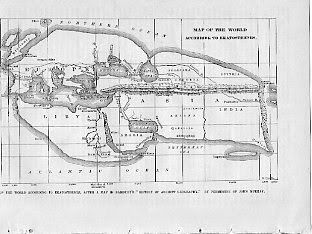Yes, and sometimes even Pothosians have an agenda!Efstathios wrote: With all respect to academic historians and those who write history books or make researches, some of them are good, and others maybe not including all the sources, and yet others maybe serving agendas.
I would like to see some support for this claim. You have argued before that a particular writer’s perspective on history was unduly influenced by their own beliefs. Are you now saying the opposite – that they write against their beliefs and/or their research? And could you explain how you know what any particular academic truly believes.And there are also academics that do not write what they truly believe, or have found out from research because they want to keep their prestige high.
What was there to keep the fleet from reaching Australia and Polynesia anyway? Think about it. If it happened or not it's another story. It is a part of the object for discussion of this thread.
Surely the onus is on you to do the research in support of this claim? For instance, what’s the shortest distance a trireme traveling to Australia could have gone without needing to make landfall for supplies; i.e., what’s the maximum amount of water and food that they could have carried (along with the crew) and how long would it have lasted? How fast could a trireme travel by oar and how long could they maintain said speed? How much could they rely on rowing in the currents of the open ocean and how much would they have been dependent on sails? How dangerous are the currents and height of the waves in the open ocean; i.e., how safe would the fairly shallow bottomed boats with openings for oars near the water level have been? There are obviously many more similar questions which need to be answered in support this hypothesis, but add to them the question why, if they made landfall in other hitherto unknown lands between India and Australia would they have continued onwards without returning to report their findings? Is there any archaeological evidence to support this landfall? If you believe they could have sailed straight from Sri Lanka to Australia then please explain how they could have done it given the distance, time taken, and supply situation. I'm sure you can figure out many other questions which need to be answered in anticipation of the responses here. I’m open to a serious discussion if you so desire, but would you expect me or any other member to do all the initial research necessary to disprove the hypothesis before any work has been done to support it?
I must have misunderstood - I thought the initial question was about the disposition of the fleet rather than Nearchus himself. After the death of Alexander Nearchus served with Antigonos and is last mentioned “as one of four advisors … left by Antigonos with Demetrius Poliorcetes in Syria in 313/12." (Heckel’s Who’s Who in the Age of Alexander the Great) Even if Nearchus had afterwards decided to continue exploration on his own, Alexander’s fleet wasn’t built for his own personal use. He didn’t OWN it. One might safely assume that it had been claimed by one of the Diadochi and pressed into some kind of service in the intervening decade. (Which brings about another question; how long would a trireme have remained serviceble?) Either way, it’s obvious that Nearchus did not immediately take more than 30 triremes off on a voyage of exploration, so the question of what happened to the fleet after Alexander’s death is still wide open.Alexander's campaign also included the expoloration part, that is why he had a whole crew of scientists with him to write down what they saw and collect things. That is why Nearchus himself sat down and wrote his Indike, the description of what he had seen while he was sailing down the Indos river. That shows dedication to Alexander's wish and pothos for exploration, which Nearchus may had also shared, because he wrote it after Alexander's death. That is why he may had embarked on his own to continue the exploration, and maybe even establish trade for the diadochi that he alligned with.
The fleet of course could have also stayed at Greece serving the diadochi in their wars. But i think that Nearchus had far more better plans than this.
Best regards,
